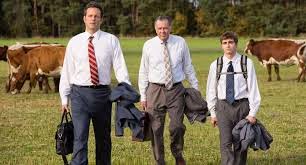 |
| Image courtesy of Warner Bros. |
In the film, Ferrell plays the type of man-child we've come to expect of him - but this time, he's a grotesquely wealthy and casually racist Wall Street type, rather than the frat boy characters he played in raunch fests "Old School" or "Step Brothers." Near the film's beginning, James (Ferrell) gets set up for some sort of hedge fund scandal and is sentenced to 10 years in prison.
Desperate, he turns to Hart's Darnell, a car wash owner who dreams of establishing a bigger and fancier wash, so that he can take his young daughter out of the South Central school she attends. For reasons too absurd to explain here, James assumes Darnell has done prison time and offers to pay him to help him toughen up, so that he can survive his stint in the slammer. Darnell realizes that this could be his ticket, so he doesn't correct James' assumptions.
The material could have made for a good comedy. In the case of a film like Mel Brooks' "Blazing Saddles," humor revolving around race resulted in some big laughs. But in the case of that film, the humor was at the expense of white perceptions of a black character.
To be fair, "Get Hard" takes some pains to poke fun at the way white people - especially wealthy ones - view persons of color, but it is also loaded with sequences that perpetuate those beliefs, especially during the numerous scenes in which James attempts to get protection in prison from Darnell's cousin (T.I.), who is the leader of a violent South Central gang.
Even more troubling is the film's casual homophobia. The most consistent joke of "Get Hard" is that James will likely become somebody's "bitch" in prison and numerous punchlines revolve around whether Ferrell's character will be able to withstand the sexual favors he will be forced to proffer once he's behind bars. During one sequence, Darnell takes James to a gay bar to practice giving blow jobs - as if that and being sexually assaulted in prison are one and the same.
Also, James' wife (Alison Brie, of "Mad Men") is portrayed as a castrating gold digger, while a woman involved in T.I.'s gang with whom James sort of becomes involved is mostly utilized for sexual purposes. Darnell's wife (Edwina Findley) is the only woman portrayed sympathetically. For good measure, the picture throws in some jokes at the expense of Latinos as well.
In the end, James and Darnell begin to appreciate each other's merits and the filmmakers attempt to wrap up the movie with what appears to be a plea for tolerance. However, "Get Hard" is another in a long line of films - which also includes Adam Sandler's "I Now Pronounce You Chuck and Larry" - that wants to have its cake and eat it too. In other words, the film wants to poke fun at all of its various minorities through the use of old stereotypes, but then asks the audience to be accepting of others. The film has a few laughs and, occasionally, some good intentions - but not enough to drown out its problematic elements.







